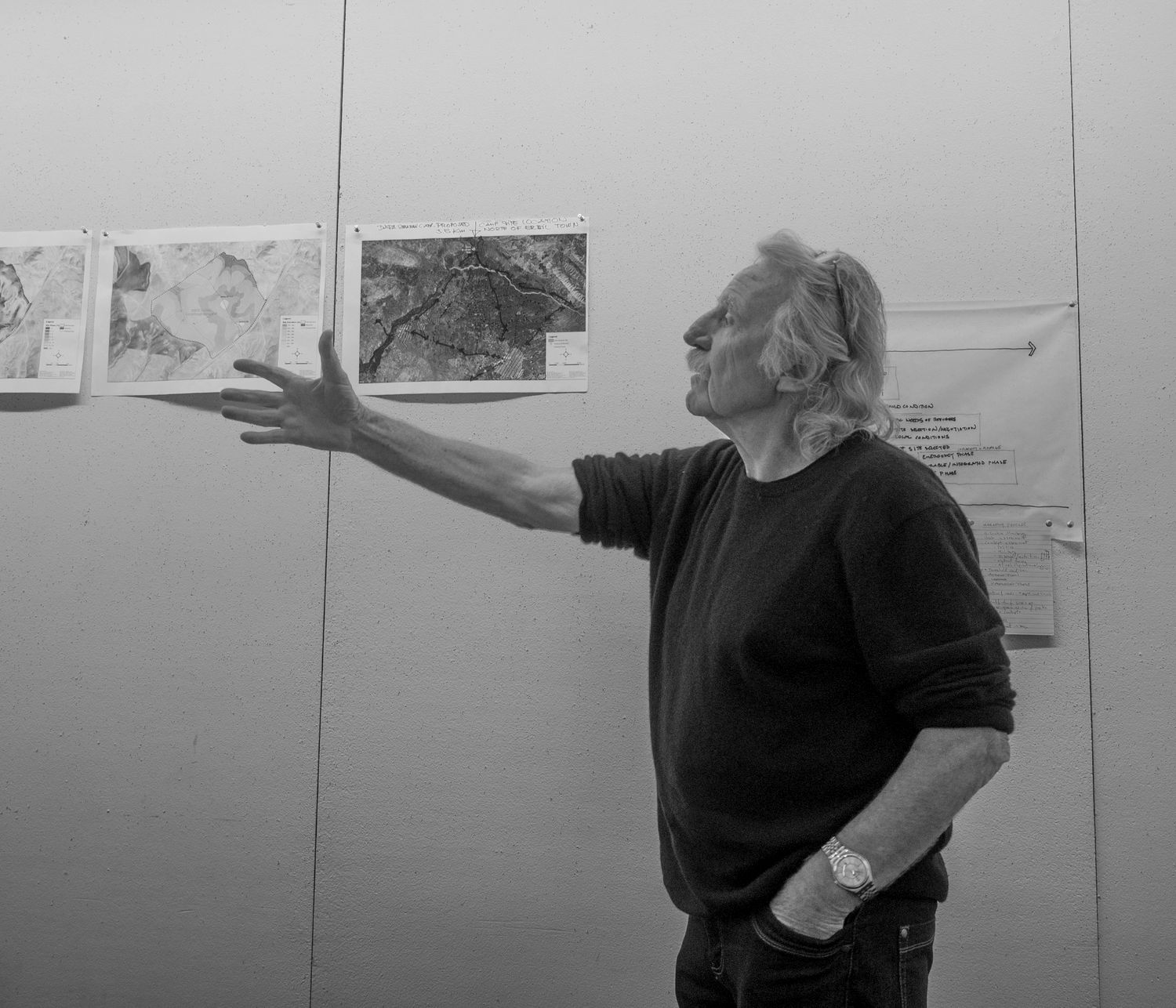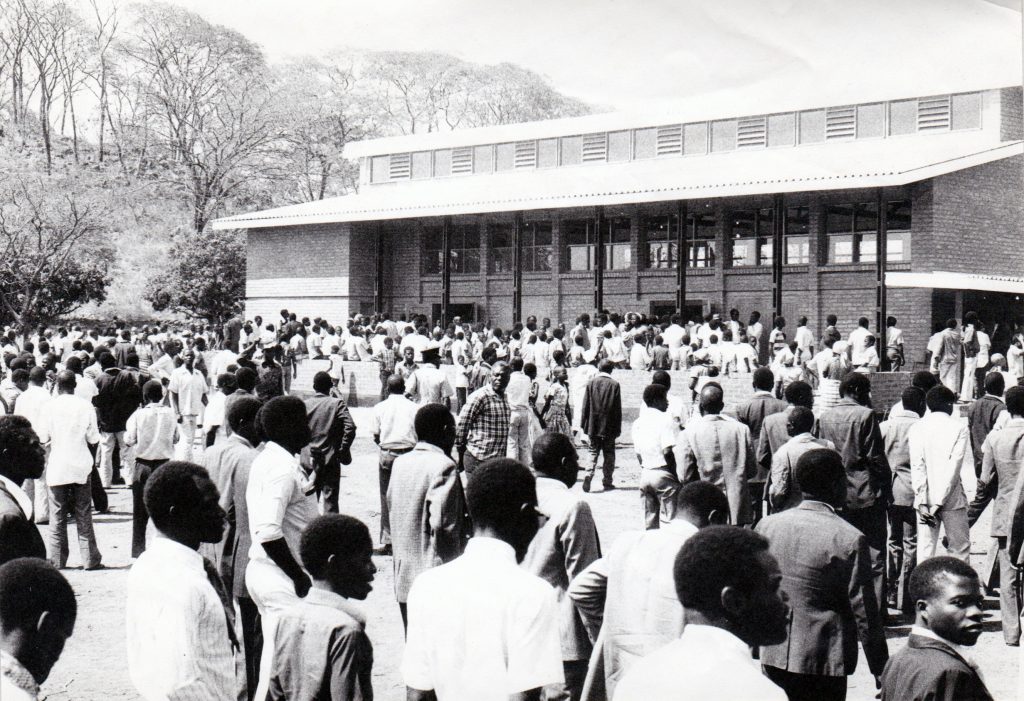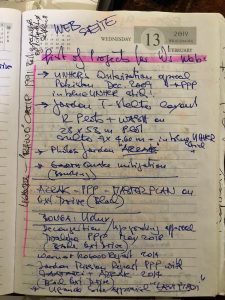
Werner Schellenberg was a very special contemporary. As an architect and planner, he devoted his professional life to people in need and refugees – all over the world.
When I visited him in April 2019 in Malawi, his last position as Senior Settlement Advisor to the UNHCR office, the UN refugee agency, we walked around Dzaleka Refugee Camp – near Malawi’s capital Lilongwe. Mainly people from the Democratic Republic of the Congo have found protection in this camp. He showed me the damage caused by the tropical rains in the paths and on the houses built from mud, and what ideas he had to use simple measures to rehabilitate this settlement. At that time Werner was 79!
Lines for new roads were laid out in an adjacent field. An expansion of the camp should be built here. Schellenberg had won the district’s construction manager to build the roads by hand without machines, for which workers were recruited from both the camp and the surrounding villages. This was typical for him, his aim was to find ways to integrate the camp into the host community – also by creating job opportunities for the local population.
In his work as a planner and coordinator for UNHCR and Welthungerhilfe in Malawi and Mozambique, Kenya and Angola, in Pakistan and Afghanistan, in Macedonia and Kosovo, he learned that the camps, which were built as temporary accommodation in an emergency situation, often existed for years and decades. In the camp he planned in the early 1990s for 25.000 refugees in Dadaab, in northern Kenya, almost half a million people lived in the meantime.
Werner Schellenberg therefore endeavored more and more to plan sustainable camps, making their locations dependent on a solid examination of the vital resources – climate, water, fertile soils and infrastructure. He was also interested in the relationship to the host community, creating infrastructures in such a way that they are useful for both sides and promoting the integration of the refugee settlements into the surrounding communities. Because of his worldwide experience with refugee camps, he was commissioned by the UNHCR in 2013 to help documenting these in a guide for future camp planning. In collaboration with Stanford University and the New York based planning office Ennead Lab Werner Schellenberg contributed significantly to UNHCR’s Master Plan Approach to Settlement Planning resulting from a longer process of re-thinking settlement planning within the context of displacement crises.
Werner Schellenberg was a doer and pragmatic organizer. In 1999 he worked for the UNHCR in both Kosovo and Macedonia during the Kosovo crisis. After the NATO war and the peace treaty in early summer 1999, hundreds of thousands of refugees returned to Kosovo and the task was to get these people over the winter. Schellenberg arranged for an evaluation of images from US sources that came from high-flying reconnaissance planes and showed that more than 67,000 of the 271,314 buildings examined were damaged or destroyed. A strategy was needed to provide protection to large numbers of people very quickly. Schellenberg thought of protective packages with plastic sheeting, wood and tools with which families could make at least one room in a destroyed house weatherproof. Because the materials involved were delicate, 56,000 of these parcels could be procured by the UNHCR in a very short time and distributed to the villages of Kosovo before bad weather set in in November and December. In order for this logistical tour de force to work, the commander of the Kosovo Force (KFOR) awarded Schellenberg a high military rank, which gave him access to KFOR equipment and personnel for this operation.
Werner Schellenberg always had new ideas and did not care much about conventions. From 1978 to 1988 Schellenberg worked as an architect and site manager in the Presidential Office for the Rural Growth Center Project in Malawi. That’s when I got to know him and worked with him for four years. When the first center was about to be officially opened, Schellenberg wanted to do something special. The showpiece of the center was the Community Hall, which was actually a bit big for the small village. In order to demonstrate how you can fill such a building with life even in a remote place, Schellenberg hired a band that was very popular in Malawi but to most people only known from the radio. When word got around, not only was the attendance at the opening event overwhelming, but when it was announced that the famous New Szene Band would play, people stormed the hall to such an extent that there was no more room for the band. Everyone had to get out again and the concert and dance took place in the village square in front of the hall. The small center Mkota with its beautiful Community Hall however, was known throughout Malawi the next day.

Werner was the most generous friend I have met. There were so many occasions where I was experiencing his generosity, but this little episode showes best what Werner was like. Some years ago Werner together with his wife Marianne and daugher Gianna came to Germany to see friends and relatives. He loved good food and was always keen to bring some from Africa to Europe or the other way round. This time he brougth avocados from Malawi – the season was just right. But he did not bring a basket or a box but one of his two suitcases was solely dedicated to Avocados, harvested at the right stage to mature at their destinations in Berlin, Munich and the lot.
Werner’s last mail of 24th October 2020, his 81st birthday, read:
„Janni and I spent this Saturday in Chikwawa with Monika and enjoyed her apple fizz with vanilla ice cream. As always, a special place to relax and ideal to chat with Gianna.
Tomorrow morning we go back to Lilongwe and from 13:00 on to Mzuzu on the way to Karonga. (MG [Malawi Government] has opened the borders and so new refugees from DRC are expected.) I will eat a good chambo in Karonga and think of you. Then I’ll be back the next weekend and get in touch to suggest an appointment for our telecommunication [ZOOM] date. The tele system is really good. This week from Malawi I took part in a tele-conference with colleagues from Bogota, Norway, Beirut, Geneva, Uganda and Pakistan and everyone we spoke to was very easy to understand, almost sitting in the same room with me. So Covid will also produce good ones.“
On 1st of March 2021 Werner Schellenberg died of Covid in a hospital in Nairobi after three weeks of fighting.
We are going to miss Werner Schellenberg, his outgoing attitude, his dedication to the communities he was working for, his generosity and the inspiration we got from him.
About this Website
Werner Schellenberg and I started this website in 2019 and he began screening his pretty well organized archive for essential documents, notes, fotos, films etc. However, progress was not very good because Werner was now and again commissioned by UNHCR in Malawi to improve and expand Dzaleka Refugee Camp and this – obviously – always had first priority for him.
His daughter Gianna however found these notes in one of his notebooks:
So we started to put up a robust structure for this site to give credit to Werner Schellenberg’s work and life following his stations and themes.
As you can see from the following table of content we have only startet to draft pages for all these stations. We plan to add more content as we recover more documents from Werner’s archive, UNHCR ressources and other sources. At this point we want to appeal to colleagues and friends of Werner Schellenberg to contribute with whatever material they have and may find unseful for this site.
Stations
Malawi – Dzaleka Refugee Camp – 2015 to 2021
Jordan – Zaatari and Asraq Refugee Camps – 2012 to 2014
Afghanistan – Chief Technical Advisor to Land Allocation Scheme for returning Refugees and IDP’s – 2009 to 2008
Pakistan – Emergency Operations and Shelter Programme – 2005 to 2006 / 2010 to 2012
Angola – Programme for Refugees in Luanda, Uige, and Zaire provinces – 2000 to 2002
Kosovo & Macedonia – Emergency Intervention in Kosovo / Camp Set-up in Macedonia – 1999 to 2000
Angola – Country Director for Welthungerhilfe, Emergency Programme for returnees demobilized soldiers and IDPs – 1996 – 1998
Mozambique – Senior Physical Planner for UNHCR’s refugee repatriation program – 1994 to 1996
Malawi – Physical Planner for UNHCRs emergency and repatriation programme for Mozambican Refugees – 1988 to 1994
Malawi – Rural Growth Centre Project – 1978 to 1988
Berlin – Associate Professor / Lecturer at Technical University Department of Architecture – 1971 to 1975
